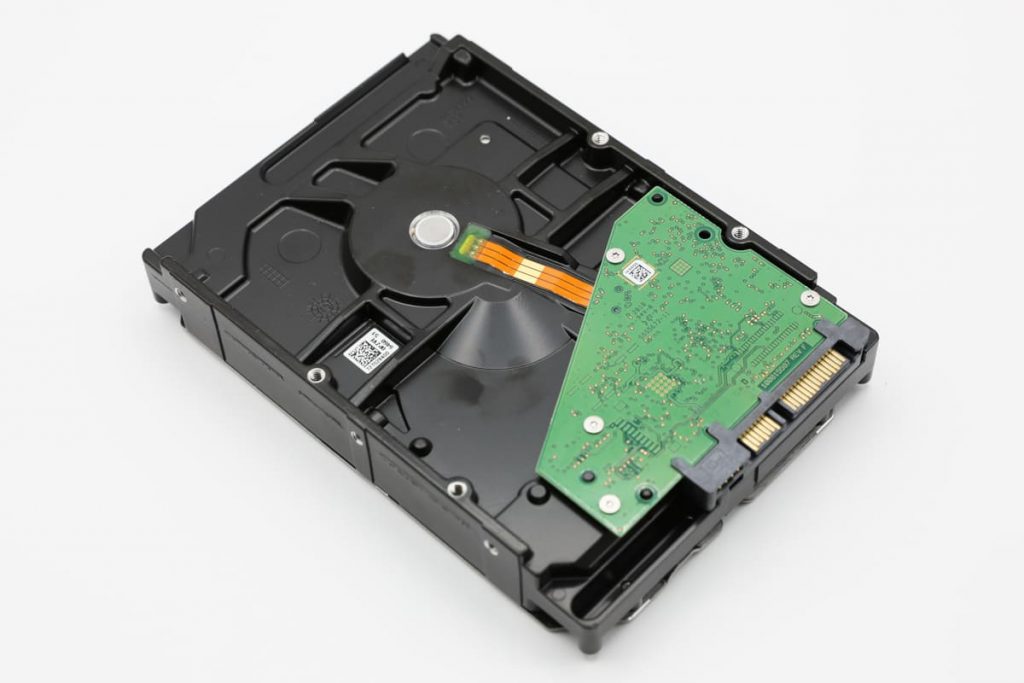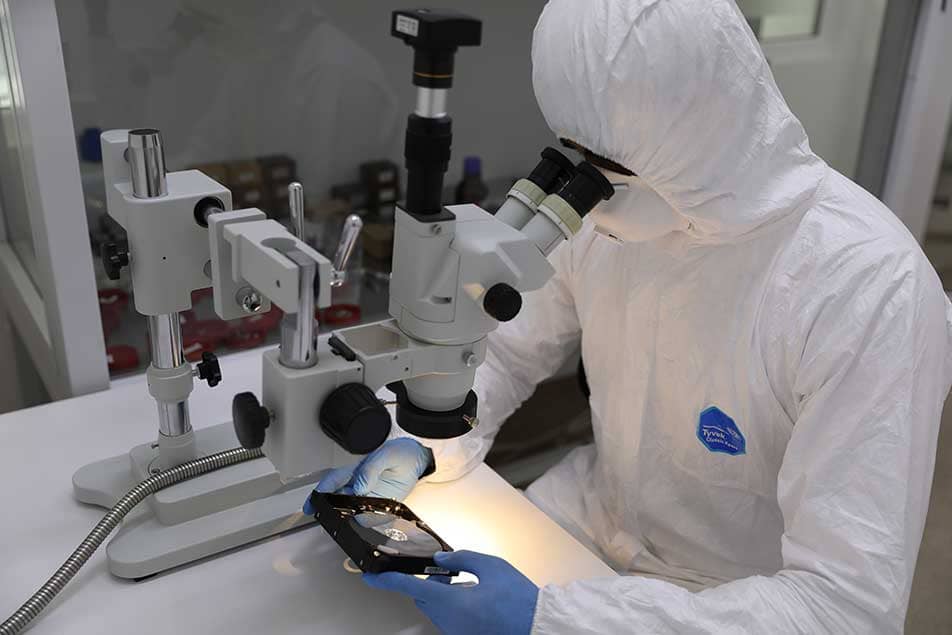When operating normally, hard drives make no sound. However, a hard drive can suddenly make unusual noises that will catch your attention. Clicking noise coming from your hard disk drive does not mean anything good. It is one of the most significant indicators that something is wrong with your data storage device.
Before doing anything with your media, it is essential to understand what caused a distinctive sound from a device. Therefore, first, you need to identify the root cause of the situation and take appropriate action.
Why is My Hard Drive Clicking?
There are a variety of reasons why your hard drive may be making clicking sounds. This can be an alarming issue, as it often indicates that something is wrong with the hard drive and may lead to data loss.
However, in some cases, the clicking sound may not necessarily mean that your hard drive is failing.
In a typical hard drive, the disk head operates smoothly.
However, if a fault occurs, its movement can become erratic, causing the controller to return to the home position repeatedly. This repetitive motion results in a clicking sound.

When faced with the unsettling clicking noise from your hard drive, it’s natural to seek immediate answers. Below, we outline some potential problems associated with your hard drive’s clicking noise.

Causes of Hard Drive Clicking
Several reasons can cause your hard drive to make clicking noises. Some of these causes are natural and normal, while others can indicate a serious problem with your hard drive.
Wear and Tear
One of the most common causes of hard drive clicking is wear and tear. As a hard drive ages, its mechanical components can start to deteriorate, causing the read/write head to make clicking noises as it moves back and forth. It is a natural process that happens over time, especially if your hard drive is used frequently.
Physical Damage
Another common cause of hard drive clicking is physical damage. Dropping or mishandling your computer can lead to damage to the internal components of your hard drive, including the read/write head. This can result in clicking noises and may also prevent your hard drive from functioning properly.

Manufacturing Defects
In some cases, a hard drive may start making clicking noises due to manufacturing defects. These defects can cause the read/write head to malfunction, resulting in clicking noises.
While this is not a common occurrence, it can happen, especially with older hard drives.
Power Surges
Power surges can also cause hard drive clicking. If your computer experiences a sudden surge of electricity, it can cause damage to your hard drive’s internal components, including the read/write head. It can result in clicking noises and may also cause other malfunctions.
Damaged Read/Write Head
A damaged read/write head is one of the most serious causes of hard drive clicking. This component is responsible for reading and writing data on your hard drive, and if it becomes damaged or misaligned, it can cause loud clicking noises. In this case, it’s important to stop using the drive immediately and seek professional help.
Service area issues
The service area of a hard drive is a reserved space where important information, such as firmware and system files, is stored. If this area becomes corrupted or damaged, it can cause clicking noises as the read/write head tries to access these crucial components. This issue may require professional help to repair.
Software Problems
Sometimes, software issues can also cause your hard drive to make clicking noises. It can happen if there is a virus or malware present on your computer or if there are errors in the file system. In this case, running antivirus software and repairing any file system errors may help resolve the issue.
How to Fix Clicking Hard Drive?
Many users react differently when their hard disk drive fails. Some power down the device and contact a reputable recovery company, while others try to solve the problem themselves.
You can find data recovery software on the Internet, but using it on your device is risky. A recovery program may handle a logical data loss, but if the files are inaccessible due to physical damage, it will not solve the problem. Many repair tutorials may advise putting your hard drive in a freezer or replacing broken components yourself.
Nevertheless, working on your device in unspecialized facilities or placing it in a freezer will not help.
Recovering data from a clicking hard drive is a complicated process that requires an individual approach, specialized tools, and cutting-edge facilities.
Therefore, it is beneficial for your media to entrust your device to a data recovery company with years of experience.

Can You Recover Data from a Clicking Hard Drive?
If you stop using your hard drive as soon as you hear clicking noises, there is a chance that you may be able to recover data from it. However, this depends on the severity of the issue, and it’s always best to seek professional help for data recovery.
Data Recovery from Clicking Drives
With years of experience and countless data recovery case studies from clicking hard drives, our team of experts is here to help. We use advanced technology and techniques to safely recover data from damaged hard drives, including those that are making clicking noises.
Both external and internal hard drives can be recovered, and we also offer expedited services for urgent cases.
By working on your device in a controlled environment, we ensure that no damage is done. PITS Global Data Recovery Services provides its clients with a positive experience and maximum results. Our specialists will successfully restore data from a clicking hard disk drive, regardless of the reason. Start your case with our data recovery experts today by filling in the form below or calling us at (888) 611-0737.
Frequently Asked Questions
Why is my hard drive making click sound?
The clicking noise from a hard drive can be attributed to a few critical issues. First, it may indicate a mechanical failure within the hard drive itself, such as the disk head crashing into the disk platter. Second, an insufficient power supply to the hard drive can cause it to function improperly and make clicking sounds. Third, external factors like physical damage or overheating can also lead to this troubling noise.
Does HDD-clicking sound normal?
No, HDD-clicking sounds are not normal and often suggest a potential malfunction. Addressing this issue is essential to avoid the risk of data loss or drive failure.
What is the Click of Death hard drive?
The “Click of Death” refers to a notorious symptom of imminent hard drive failure, characterized by a repetitive clicking sound made by the driver. This sound indicates a severe malfunction of the drive’s read/write heads, which fail to align with the data tracks on the platters properly. When a hard drive experiences this symptom, it’s critical to back up data immediately and consider replacing the drive to avoid data loss.
Why does my Seagate make a clicking sound?
Seagate hard drives may produce a clicking sound for reasons similar to other brands: mechanical failure, inadequate power supply, or external damage. Mechanical failure can include issues with the drive’s read/write heads or the spindle motor, leading to operational disruptions. It’s crucial to back up data and seek professional assistance when a Seagate drive begins clicking to prevent potential data loss.
Can you fix a noisy hard drive?
It’s possible to fix a noisy hard drive, depending on the cause of the noise. If the clicking sound is due to mechanical failure or internal damage, it may require professional data recovery services or even replacement of the hard drive. In some cases, however, the noise may be caused by external factors, such as dust or debris on the disk head, which can be cleaned.
